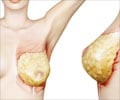Researchers have declared partial-breast radiation treatment as the hope of recovery for women in the early stages of breast cancer who have had breast implants.
The research team found that patients treated with brachytherapy have better cosmetic outcomes and avoid the risk of the implant hardening, compared to patients who undergo whole-breast radiation therapy."We are seeing an increasing number of breast cancer patients with augmentation," said Robert R. Kuske Jr., M.D., clinical professor at the University of Arizona Health Sciences Center and radiation oncologist at Arizona Oncology Services in Scottsdale, Ariz.
"By nature, these women are concerned about their appearance and we need to have options for them," he added.
Breast brachytherapy is a radiation treatment that can be given in higher doses to a small, targeted area of the breast after lumpectomy.
Radioactive "seeds" are guided into place through small plastic tubes, or catheters, with the aid of imaging and a computer. The seeds emit high doses of radiation in short bursts.
Scar tissue is minimal, the implant remains unaffected and treatment time is shortened from 6 1/2 weeks with whole-breast radiation therapy to five days with brachytherapy.
Advertisement
The women received two doses per day, separated by six hours, over a five-day period. Follow-up was six months to five years.
Advertisement
Cosmetic outcome was determined to be good to excellent in 100 percent of patients with 95 percent judged excellent. Implant hardening was not observed in any of the patients.
"Compared to traditional treatments, brachytherapy offers an excellent alternative for these women," Dr. Kuske said.
"It offers very high rates of tumor control with fewer side effects and is easier on their lifestyle," he added.
The study was presented at the annual meeting of the Radiological Society of North America (RSNA).
Source-ANI
TAN/L















